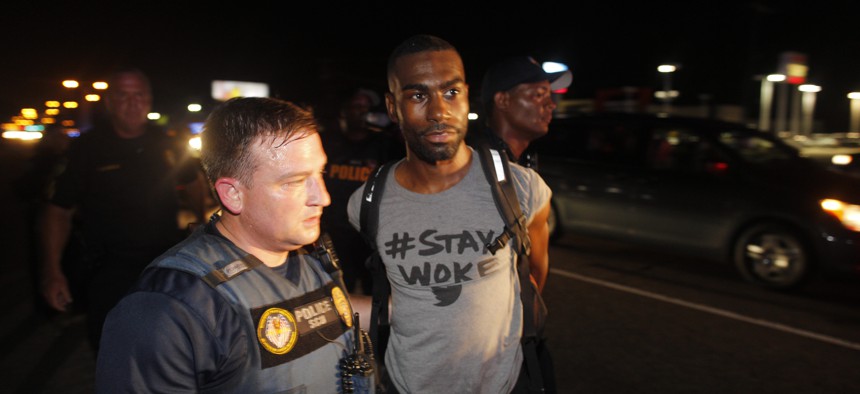“In America, political uprisings, from peaceful picketing to lawless riots, have marked our history from the beginning—indeed, from before the beginning,” wrote Judge Don R. Willett of the Fifth Circuit Court of Appeals in a remarkable opinion issued Monday. “The Sons of Liberty were dumping tea into Boston Harbor almost two centuries before Dr. King’s Selma-to-Montgomery march (which, of course, occupied public roadways, including the full width of the bloodied Edmund Pettus Bridge).”
The allusion to unruly protest is not what is remarkable about Willett’s opinion. That sort of talk is black-letter, almost boilerplate judicial language about First Amendment protection for political protests that edge up to, or even into, violence in the streets.
What is remarkable is that Willett wrote them in a surprise opinion, changing his vote in one of the most important First Amendment cases now pending in front of the Supreme Court—Mckesson v. Doe, in which a Louisiana police officer is attempting to impose possibly ruinous tort damages on DeRay Mckesson, a national leader of Black Lives Matter. Doe (who is proceeding under a pseudonym) claims that Mckesson owes him damages because the officer was injured in a protest outside the Baton Rouge Police Department on July 9, 2016. During that protest, someone in the crowd threw a hard object that injured the officer. Mckesson was present that night, but Doe doesn’t claim that Mckesson threw the object; instead he claims—in defiance of Supreme Court precedent—that Mckesson owes him damages because the civil-rights leader did not prevent the nameless protester from throwing the object.
This is a theory of liability unknown to the First Amendment. In an important case arising out of the civil rights movement, the Court held in 1982 that protest leaders can’t be sued for the violent actions of others unless the plaintiffs can show the leaders themselves either engaged in violence or incited or directed the violence. Doe alleged “incitement,” but made no real attempt to show it.
The First Amendment and civil-liberties communities were shocked by the Fifth Circuit’s original decision, issued in March, which brushed aside the First Amendment with the breezy bromide that “the First Amendment does not protect violence.” The decision was unanimous—Willett was on the panel, but the opinion was written by Judge E. Grady Jolly. (Judge Jennifer Walker Elrod was the third member.) That opinion was a dagger pointed at the heart of the treasured American right to protest against government action. If protest organizers can be sued, and possibly ruined, by lawsuits if anyone at their protest (even, say, an undercover police officer) turns violent, no ordinary citizen would dare organize protests.
Mckesson’s lawyers asked the Fifth Circuit to re-hear the case “en banc” (as a full court); in response, the same panel withdrew its original opinion and substituted a new one that said, in legal verbiage, “we agree with ourselves and by golly we are right.”
The case landed in the Supreme Court’s inbox on December 6. Mckesson’s petition for the Court to hear the case, written by ACLU lawyers, pointed out that the Fifth Circuit panel decision flatly defied the Court’s own precedent in a landmark case called NAACP v. Claiborne Hardware. Advocates of free speech were holding their collective breath waiting to see whether this Court, which preens as a First Amendment champion when the rights of corporations or the rich are at issue, would call out the wayward panel or silently ratify its radical change in the law.
The latter course just got harder. Willett, a Trump appointee and former Texas Supreme Court justice, has now changed his vote and issued a full-throated defense of the idea that free speech covers even unruly protest.
“I have had a judicial change of heart,” Willett wrote. “Admittedly, judges aren’t naturals at backtracking or about-facing. But I do so forthrightly. Consistency is a cardinal judicial virtue, but not the only virtue. In my judgment, earnest rethinking should underscore, rather than undermine, faith in the judicial process. As Justice Frankfurter elegantly put it 70 years ago, ‘Wisdom too often never comes, and so one ought not to reject it merely because it comes late.’”
The words are true, and the practice of judicial self-examination is, while not unheard-of, regrettably rare. In this case, re-examination led Willett to see two gaping holes in the majority’s case. First, he pointed out, despite the panel’s earlier decision, it’s not clear that even Louisiana tort law would support a lawsuit against Mckesson. To reach that conclusion, the panel had to, in essence, make new Louisiana state law. Every second-year law student knows that is a practice courts of appeals are supposed to try to avoid—especially when doing so creates a federal constitutional issue.






